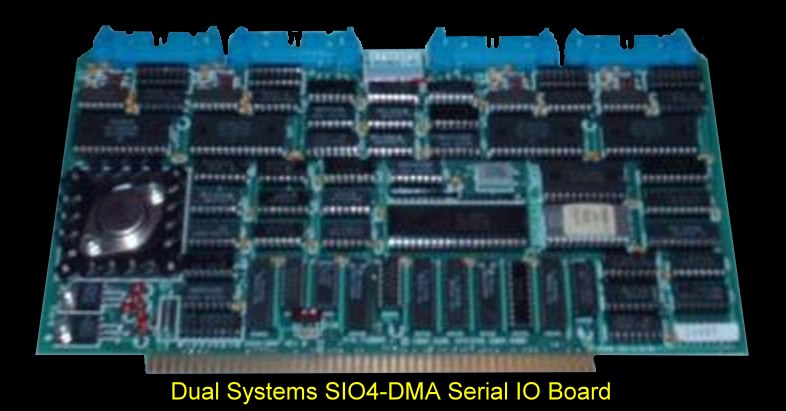
Dual Systems -- SIO4 Serial I/O Board
The SI04-DMA was an intelligent, high performance,
four-port serial input/output board. It conformed to the IEEE-696/ S-100
specification but is also designed to work with older S-100 systems.

The board was intended to be used with asynchronous
terminals or printers in multi-user systems and had the necessary features
to work with modems. A limited synchronous mode capability added
flexibility.
All input data to the SI04-DMA passed through a 256-byte FIFO buffer,
removing the requirement for a fast response time from the operating system
and avoiding the possibility of "lost" characters. On output, the SI04-DMA
reads characters directly from the S-100 machine's memory via DMA
and transfers them to the serial port. This reduced the operating systems
overhead for output operations several hundred times. The board was capable
of a full 24-bit address range and incremented over any address boundary.
Baud rate was independently selectable on each channel by program. Sixteen
of the most popular speeds were provided.
Applications
The SI04-DMA was the first S-100 serial interface board designed
specifically to reduce operating system overhead in multi-user systems. The
tasks normally performed by the operating system to handle serial input and
output are assisted by intelligence built into the onboard microcomputer
(8085A) assisted S104.
Specifications
Bus Compatibility: The SIO4-DMA was compatible with the
IEEE 696/ S-100 specifications as defined in January 1982 and was suitable
for systems with up to 8MHz clocks. The SI04-DMA was also intended lo be
compatible with many older S-100 computers.
IEEE 696/S-100 Compliance: M24, VI, TM, F8, W1-16. Number
of wait states depends on S-100 dock rate and state of SI04-DMA when
accessed.
Address Selection: I/O address selected by DIP switch.
Eight bits of VO address are decoded.
Operating Power: The maximum power consumption is: +8
Volts® 1.3 Amps +16 Volts® 0.1 Amps -16 Volts ©0.1 Amps
RS-232 Compliance: All RS-232 drivers and receivers conform
to the RS-232 specification. The SI04-DMA can simulate either a modem (DCE)
or terminal (DTE) for connection to a terminal or modem respectively.
Synchronous Mode: In the synchronous mode the external clock signal
determines receive baud rate. A transmit clock is provided by the SI04-DMA
at the selected baud rate. Baud Rates:
Baud rates are available: 45.5.....9600.....3840.
I cannot locate a better image for this very useful board. Nor can I locate
a manual.
If you would like to submit one or both please let me know.
There is a great write-up on this board in the March 1984 Microsystems
Journal (Vol 5, p103).
Other Dual Systems
S-100 Boards
68000 CPU
256K RAM
Clock Board
CMEM-RAM
Digital-to-Analog
Analog-to Digital
4SIO
EPROM
This page was last modified
on
01/08/2011


